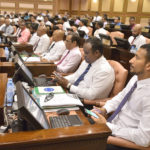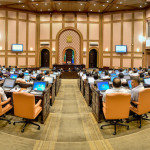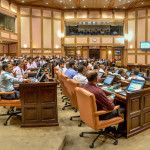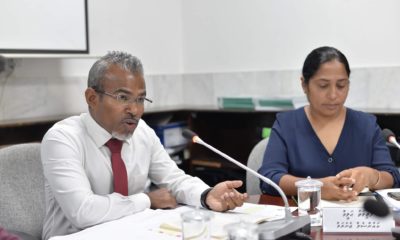The parliament approved Monday a long-awaited bill detailing criminal justice procedures with cross-party support. Some 68 MPs unanimously voted for the bill, which has been pending for seven years at the People’s Majlis.
The landmark Criminal Procedure Act, comprising of 30 chapters, codifies in detail the rules to investigate, prosecute and pass judgment on suspected criminal offenders.
The foreign ministry hailed the bill’s passage as “a milestone” which would strengthen the Maldives criminal justice sector, currently under fire for “grossly unfair” trials against high-profile opposition politicians, including former President Mohamed Nasheed. The criminal justice sector has also been criticised for its failure to bring suspects accused of major crimes to justice.
Ahmed Usham, deputy attorney general, said the bill was “a key piece of legislation which will fill in the procedural gaps and vacuums in the Maldivian judicial system as it codifies all processes since the initiation of a criminal investigation until the serving of a sentence.”
He added: “Before the bill’s introduction, much of the criminal justice processes was at the discretion of those in positions of power,” resulting in inconsistent rulings and failure by state bodies to follow precedence.
The bill identifies terrorism, murder, manslaughter, causing grievous bodily harm, gang violence, terrorism, crimes against minors, drug trafficking, money laundering, corruption and human trafficking as major criminal offences.
It lays out specific rules for law enforcement agencies and the courts with suspects and convicts, from filing a complaint, to investigations, pressing charges, trial, conviction, request for clemency and filing an appeal.
The details include the process of waiving the right to legal counsel, and special investigative procedures for disabled people.
Shahindha Ismail, executive director of human rights group, the Maldivian Democracy Network, said she welcomed the passage of the criminal procedures code, but said the government had refused to engage with human rights groups on their recommendations to the bill.
“We remain cautious,” she said, adding that a detailed comment can only be made after reviewing the new bill.
The code was originally drafted along with a new penal code in 2005 and submitted to the parliament under former President Maumoon Abdul Gayoom’s administration.
It was redrafted under former President Mohamed Nasheed’s administration, and passed under President Abdulla Yameen’s regime.
Bills on handling evidence and civil procedures are still pending.
The parliament has drawn criticism for the ten-year delay in passing the bill, especially as violent crime is on the increase in the Maldives.





















